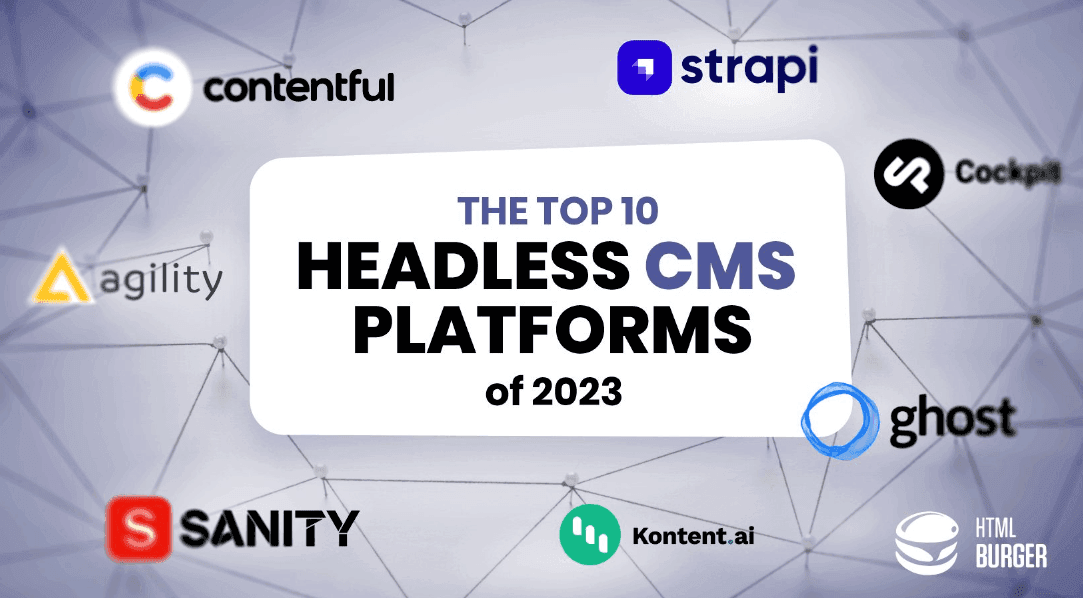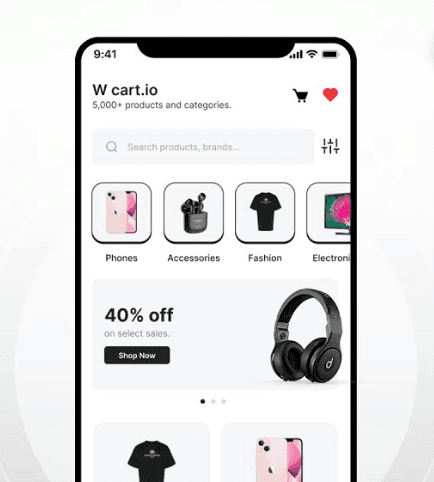What Is the Best Headless Ecommerce CMS 2023

Headless content management systems (CMS) have revolutionized how merchants manage and deliver content to their audiences. With this change comes stiff competition that could threaten your ecommerce businesses if you still use traditional content management methods.
Top brands are increasingly adopting the headless approach to make them more agile, with sites that load faster and deliver excellent user experience. Going headless brings many benefits, including maximum flexibility, enhanced scalability, and better security—making your business more competitive. However, not all headless platforms are created equal. In this article, we examine the best headless ecommerce CMS in 2023 to point you in the right direction.
Headless Commerce CMS Vs. Decoupled CMS: What’s the Difference?
If you are familiar with the headless concept, you know that it involves a decoupled front end and back end. That’s why distinguishing between a headless ecommerce CMS and a decoupled one can be challenging. But it shouldn’t be. Indeed, some resources use the two terms interchangeably.
So, let’s get some clarity around them. A headless and decoupled CMS are not identical, even though both have a separate front-end layer and back-end functionality communicating through APIs (application programming interfaces).
A headless content management system (CMS) is a back-end-only solution. It means the platform comes without a corresponding user interface, so you must build one using compatible third-party technologies.
In contrast, a decoupled CMS has an optional front-end presentation layer, even though it is decoupled from the back-end functionality. So, while a headless system relies on external or third-party channels to display content, a decoupled CMS can be autonomous.
Best Headless Ecommerce CMS Platforms in 2023
Headless commerce CMS platforms perform the same functions and share basic features. They all let you create content from a central dashboard, store, and distribute it across various channels or storefronts via APIs. However, various headless ecommerce CMS platforms perform better in some scenarios than others. Let’s look at some of the leading options on the market and what they excel at.
Contentful—best CMS for building digital experiences
Contentful is a leading name in the API-first CMS market. It excels at building digital experiences with a quick and easy way to publish content in a multi-channel environment.
It boasts the perfect headless CMS model as a content-as-a-service solution. The model allows content managers to unleash creativity and leverage the platform’s flexibility to create compelling digital experiences.
It also allows developers to build unique experiences by choosing the best design and using their favorite frameworks and tools. Equally, marketing teams can use its intuitive web interface to create relevant content and maintain quality in their delivery without relying on IT.
Contentful is purely headless, with its repository housed on GitHub. It works with both GraphQL and REST technologies and features starter templates ideal for smaller organizations to use for building and managing content.
Sanity—most customizable headless CMS
Sanity is an open-source headless ecommerce CMS that directly integrates with static site generators and connects to front-ends, significantly simplifying the management of content modules.
Developers can enjoy the best customizability with this CMS. Its intuitive interface and the fact that it is cloud-native help simplify real-time collaboration with content managers, developers, and marketers.
Such collaboration goes a long way in reducing mistakes and ensuring every content goes to the right place.
Additionally, Sanity has extensive integrations that allow easy transfer of data and content into any desired application.
The CMS also boasts some of the best data analytics that makes it easier to optimize and improve content development.
Contentstack—best for fast-paced content management
Contentstack is a MACH-based content management system. This means it combines four major software development concepts, namely microservices, API-first, cloud-native, and headless. A MACH-based solution like Contentstack allows developers to create future-proof and highly scalable ecommerce solutions.
Its RESTful API ecosystem helps simplify output to various graphic user interfaces. Meanwhile, the CMS’s content repository and scheduling features provide users with more comprehensive content management.
Since Contentstack supports fast-paced content management, it can help ecommerce enterprises onboard new users quickly, produce content faster and scale faster.
The platform is also highly customizable, allowing developers to be creative without feeling restricted.
Strapi—best for easy set-up
Strapi is designed to allow developers to build apps quickly using GraphQL or REST. Developers can also use third-party tools or custom plugins to extend the platform’s functionality, thanks to its developer-first approach.
Meanwhile, it empowers content managers and marketing teams to create, edit, and distribute content across headless front ends without relying on development teams. With this approach, Strapi empowers ecommerce enterprises to market and sell more effectively through storytelling.
Strapi also builds APIs automatically based on content models, which simplifies the work of developers.
This open-source CMS platform is fully based on Javascript, and its repository is housed on GitHub. It supports integrations with several frameworks and programming languages, making it popular with leading brands like Walmart and Toyota.
Magnolia—best composable digital experience platform
Magnolia is among the oldest headless CMS solutions available. It features built-in workflows, allowing users to organize, publish, and manage content even in complex teams with cross-functional roles.
The CMS platform is designed to simplify the creation and management of digital experiences. Unlike many headless CMSs on this list, Magnolia houses its repositories on Git and Apache Jackrabbit and supports technologies like Java, RESTFul API, Maven, NPM, and Github.
Magnolia comes with pre-built integration modules with Google Analytics tools, Salesforce, SAP Commerce, and CommerceTools, which can be pretty beneficial.
When using this CMS, you can self-host it or store your app on the cloud.
dotCMS—best hybrid CMS
dotCMS is a hybrid CMS, so it offers a user-friendly interface with traditional content authoring tools for editors and content creators. It also provides a headless JavaScript-based CMS platform that developers can use to create custom solutions like apps.
The dotCMS architecture supports the creation of scalable content-driven apps. It uses GitHub to store its open-sourced repository that supports Java technology for its users.
The CMS is designed to integrate seamlessly with marketing automation tools and ecommerce platforms. This makes it excellent for ecommerce merchants who wish to create best-in-class ecosystems for handling their commerce needs.
dotCMS users can implement features that are crucial to ecommerce businesses, such as integration with marketing automation systems and AI platforms.
Kontent—Best headless CMS for marketing teams
Kontent is a headless CMS platform that takes a SaaS model. It is a modern solution designed to create digital experiences across all types of devices.
If your marketing teams want a CMS that gives them full control over content, then this cloud-based software is an excellent choice. The CMS allows marketers to manage content in a central unified hub where they can collaborate in real time.
This hub supports content management needs such as creating new product listings and updating websites without relying on developer support.
Its repository is based on GitHub and supports various scripting languages, including JavaScript, PHP, .NET, Ruby, and Java. It has a wide range of governance features, making it ideal for large enterprises adopting a headless ecommerce approach.
Developers using Kontent can choose their preferred tech stack and integrate with various top ecommerce tools to facilitate faster and seamless deployments. For instance, they can leverage the platform’s content-as-a-service capabilities to build custom API-first storefronts.
This way, the CMS helps businesses adapt quickly to changing customer needs with an agile approach.
Why Do You Need a Headless CMS?

An ecommerce CMS can be a significant game changer as it helps automate content management, leaving you with more time to dedicate to running your business. It can simplify running your ecommerce enterprise by managing everything related to content.While that sounds sufficient, it’s not enough in today’s omnichannel ecommerce market. That is where a headless CMS comes in. It extends the capabilities of a traditional ecommerce CMS to suit a connected, multi-channel business environment.Additionally, while ecommerce platforms like Shopify and Magento can often have a CMS, content management is not their primary focus. So, they tend to have limited content management capabilities regardless of how robust the ecommerce platform is.Therefore, an ecommerce headless CMS comes in handy to integrate with the ecommerce platform ad extend its content management capabilities.Such ecommerce headless CMS solutions are especially useful for large brands that can find the CMS built into their ecommerce platform limiting or restricting.In a headless environment, you don’t have to use the CMS that comes with an ecommerce platform. The decoupled architecture allows you to pair a headless CMS with the ecommerce platform and use APIs to deploy content to various front ends.With a headless CMS, your ecommerce solution can focus on its primary role: run the business side of your online store.
The Best Headless Ecommerce CMS 2023: Final Take
In this article, we have differentiated between a headless and a decoupled ecommerce CMS. We have further presented the best CMS for headless commerce in 2023 and explained why you need one.Here are the best headless ecommerce CMS platforms and their best uses.
Kontent—Best headless CMS for marketing teams
dotCMS—best hybrid CMS
Magnolia—best composable digital experience platform
Strapi—best for easy set-up
Contentstack—best for fast-paced content management
Sanity—most customizable headless CMS
Contentful—best CMS for building digital experiences
Of these content management systems, Contentful is our best recommendation. It is an excellent CMS that will do a great job of managing various aspects of your ecommerce site.If you want any custom solution based on these recommendations, the team of developers in Los Angeles can help. Start your free consultation.
